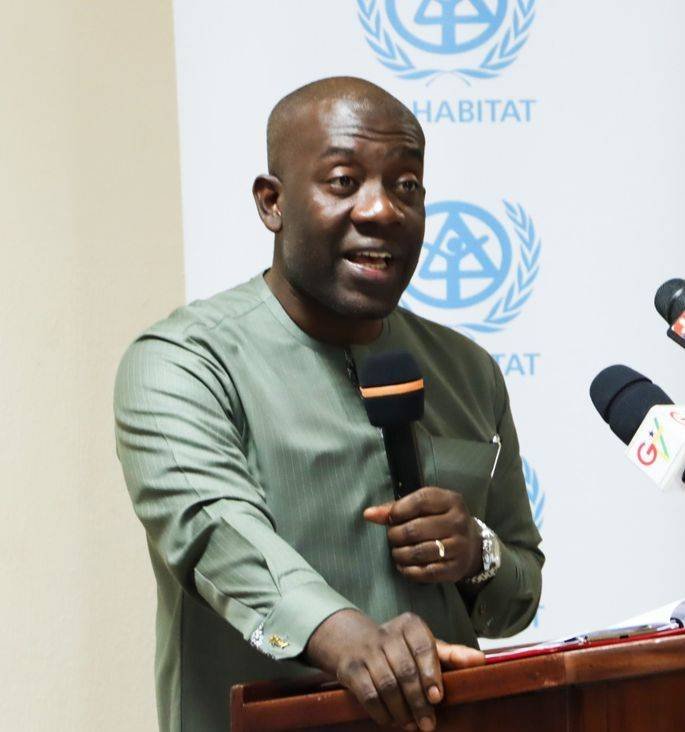
According to myjoyonline report, Minister for Works, Housing and Water Resources, Gilbert Adjei, has urged real estate developers to strengthen public-private partnerships. Speaking at the unveiling of VAAL Real Estate, Ghana’s latest high-rise project (Agora project), Mr Adjei underscored the government’s commitment to fostering an environment conducive to the growth of the real estate sector.
The Minister reiterated that the government is fully committed to providing conducive environment for the real estate sector to flourish. “We understand the importance of partnership in addressing the housing deficit, and we are here to ensure that the regulatory and financial frameworks support these ventures. The housing deficit in Ghana has become a pressing issue, with urbanisation and population growth placing increasing pressure on available housing stock,” he stated.
To bridge this gap, he said the government is encouraging greater involvement from the private sector, providing incentives, facilitating land access and ensuring smoother regulatory processes. The Agora project, designed to blend modern living with sustainability, reflects the possibilities of such partnerships. It promises to offer contemporary housing solutions, with a focus on luxury and affordability, setting a new standard in Ghana’s real estate industry.
We are currently facing an increasingly dire housing crisis. With a national housing deficit estimated at over 1.8 million units, access to decent, safe and affordable homes remain out of reach for many citizens. The country’s rapid urbanisation, rising population and limited public sector capacity to address the growing demand for housing have compounded the situation.
As the need for sustainable solutions becomes ever more urgent, it is refreshing and commendable that the Minister for Works, Housing and Water Resources has taken a bold stance in urging real estate developers to strengthen public-private partnerships (PPPs) to address this national challenge.
The Minister’s call for stronger collaboration between the state and private developers is both timely and necessary. Ghana’s housing problem is too large, too complex, and too urgent to be tackled by government efforts alone. It requires a multi-stakeholder approach, with the private sector playing a central role in design, financing, and delivery supported by a regulatory framework that is responsive, transparent, and efficient.
Public-private partnerships offer a strategic pathway to unlocking the full potential of Ghana’s housing sector. Globally, PPPs have proven effective in mobilizing resources, fostering innovation, and accelerating the delivery of public goods.
In countries like Kenya, India, and Morocco, such partnerships have successfully produced thousands of housing units by leveraging private capital and technical expertise while maintaining government oversight to ensure affordability and quality. Ghana can and must learn from these examples.
The reality is that successive governments have not been able to keep pace with the increasing demand for housing. Budgetary constraints, and land tenure complications have slowed down state-led housing projects. In contrast, private developers have the financial flexibility and operational efficiency to deliver projects more quickly and at scale provided the environment is enabling. Therefore, the Minister’s assurance that government will ease regulatory bottlenecks, facilitate land access, and offer incentives is not just welcome; it is critical.
However, this commitment must be more than rhetoric. If Ghana is to truly benefit from the PPP model, the government must ensure that its promises are backed by concrete reforms. Land acquisition processes must be streamlined, mortgage financing must be made more accessible especially to first-time homebuyers and low-to-middle-income earners – and tax incentives should be introduced for developers who allocate a portion of their projects to affordable housing.
The Agora project, while primarily a luxury development, illustrates what is possible when the private sector is allowed to innovate within a supportive policy framework. The project’s emphasis on sustainability and modern living can serve as a model for future developments particularly if such innovation can be extended to affordable and middle-income housing.
As Minister Adjei rightly pointed out, the government has a responsibility to foster an environment that supports the private sector in playing a more active role in housing delivery. But the private sector, too, must rise to the occasion.
Developers should resist the urge to focus solely on high-end properties and instead commit to inclusive development. Affordable housing should not be seen as a charitable endeavor but as a profitable and socially impactful business opportunity.
The call made by the Minister must now be followed by deliberate policy actions, bold investments, and sustained collaboration. Housing is not just a political issue – it is a moral one. And if we get this right, the benefits will echo far beyond rooftops and walls. They will shape the very foundation of a more equitable, prosperous Ghana.
The post Editorial: Government Must Tackle Housing Deficit appeared first on The Ghanaian Chronicle.
Read Full Story













Facebook
Twitter
Pinterest
Instagram
Google+
YouTube
LinkedIn
RSS